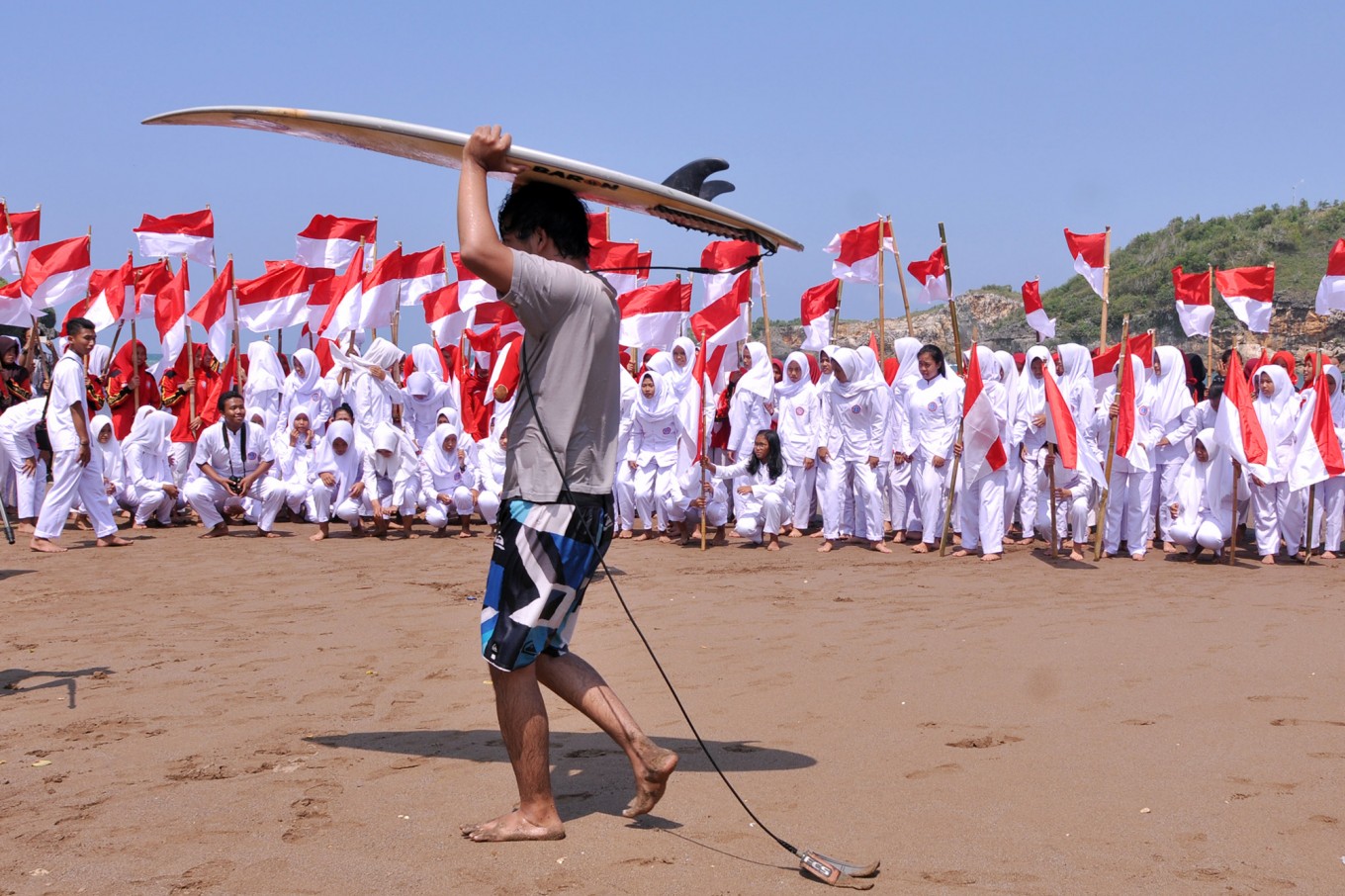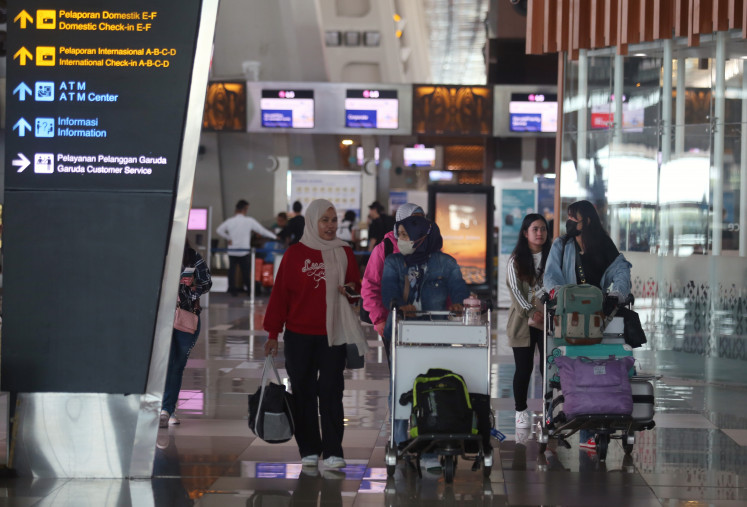Indonesian language breeds cultural heroes
Renowned poet Taufiq Ismail, for example, is one of the cultural actors who emphasizes the importance of literature as cultural identity to students. He is not just busy writing poems for personal and commercial interests.
Change Size
 A surfer walks past a group of students carrying Indonesian flags on Baron Beach, Gunung Kidul, Yogyakarta. JP/Alb Magnus Kus Hendratmo (The Jakarta Post/Alb Magnus Kus Hendratmo)
A surfer walks past a group of students carrying Indonesian flags on Baron Beach, Gunung Kidul, Yogyakarta. JP/Alb Magnus Kus Hendratmo (The Jakarta Post/Alb Magnus Kus Hendratmo)
O
n Nov. 10 we celebrate National Heroes Day to recount the battle between the arekarek (young people) of Surabaya and Dutch soldiers, or the Netherlands Indies civil administration (NICA) being underpinned by the British army in 1945. It was the heaviest fighting of the revolutionary period and has become a national symbol of Indonesian resistance.
The toughest challenge for the recent generation in redefining the very nature of heroism is the loss of ability to contextualize the message and value. This is not simply seen from the strongly ceremonial tendency marked by nearly forgotten national heroes on pamphlets or posters. No less disappointing is that many no longer devote themselves to sharing and giving.
Standing for Eastern culture and society, Indonesia is in dire need of cultural heroes. It is certain that they are not only humanists, writers, poets or artists. The key to understanding the cultural heroes of today is that they do not see culture for culture in itself, or art for art. They are those who take pride in being Indonesian with their language, art or customs — things with which this nation closely identifies.
Renowned poet Taufiq Ismail, for example, is one of the cultural actors who emphasizes the importance of literature as cultural identity to students. He is not just busy writing poems for personal and commercial interests. His movement, along with other writers, to popularize literary works to students through a “students ask, litterateurs answer” program could be viewed as an attempt to bind the students with their identity through fiction.
Literature teaches learners to get used to thinking of alternatives, love the nation’s history through the narrative of dialogue and absorb values in ways that are far from brainwashing.
Taufiq’s approach to literature is truly rare. While many authors, poets or playwrights believe that writing is very personal, he actually moves beyond shades of the intellectual status quo by transferring abstract ideas to the real intellectual tradition through fiction writing programs at schools.
Culture turns dim when the language that supports it fails to be a source of price for its native speakers. It will fade when Indonesian is no longer an instrument of identity in daily communication. As such, guardians of Indonesian are heroes amid a flood of foreign terms. Anyone can take a small step to train young people to love Indonesian. Businesspeople can take part through the use of Indonesian rather than English in selling products or providing services by, for example, writing es kopi instead of iced coffee on a menu or kedai kopi rather than coffee shop.
Parents play a pivotal role in instilling a love for Indonesian by having their children speak formal Indonesian at home. That will, in turn, reduce the gap between the smeared basic linguistic variety of the language and the formal variety in the school system. Unlike natural sciences, teaching Indonesian seems to have moved to become less progressive. Oral teaching, for instance, has shown no distinct characteristics for the last 20 years. Research on Indonesian rules has hardly developed.
Having foreign language skills for global communication and educational purposes can be understood. Yet speaking a foreign language with friends or locals as part of a lifestyle is very likely to cause cultural inferiority. The national movement to love Indonesian, therefore, could start by making it the language of science at schools and colleges.
Language politics need to develop a collective consciousness and social engineering continuously translated into various policies that involve all components of the nation. In this case, the French public is a remarkable model. From a housekeeper to a university professor, they are proud of speaking French. No wonder a cleaner does not serve or reply to someone who asks a question in English in that country.
It is no surprise that seminar rooms with American or English speakers are not filled with students. Yet French students and professors still catch up with world discourse due to their mighty intellectual tradition and the incredible translation skills in the country.
Businesspeople, parents, students and other members of society would contribute to the nation’s cultural survival if they used Indonesian as an identity to think, communicate and interact. On the contrary, a lack of confidence to speak correct Indonesian in public areas is likely to make the ethos of nationalism go unnoticed.
Language represents the nation. Reluctance to speak a language in a formal and correct fashion could manifest in a crisis of confidence. WS Rendra, Mochtar Lubis, Pramoedya Ananta Toer and Widji Thukul are great not only because they bore witness to the truth but also because they made language a tool to inspire many people.
We need cultural champions proud of their own identity to reform people through Indonesian as a medium of empowerment.
***
The writer is a lecturer at the School of Cultural Sciences, Andalas University, Padang, who is pursuing a PhD at Deakin University, Australia.
---------------
We are looking for information, opinions, and in-depth analysis from experts or scholars in a variety of fields. We choose articles based on facts or opinions about general news, as well as quality analysis and commentary about Indonesia or international events. Send your piece to community@jakpost.com. Click here for more information.








